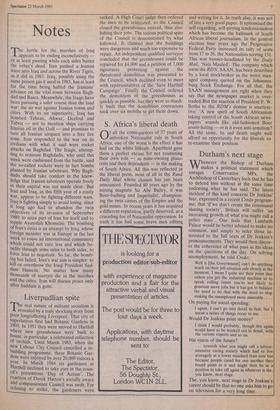Notes
The battle for the marshes of Iraq appears to be ending inconclusively or at least pausing while each sides buries the other's dead. Iran pushed a human wave into Iraq and across the River Tigris, as it did in 1983. Iraq, possibly using the same poison gas it used in 1983, has at least for the time being halted the Iranians' advance on the vital route between Bagh- dad and Basra. Meanwhile, the Iraqis have been pursuing a safer course than the land war: the air war against Iranian towns and cities. With its air superiority, Iraq has bombed Tehran, Ahwaz, Dezfoul and Tabriz — not to mention ships carrying Iranian oil in the Gulf — and promises to turn all Iranian airspace into a free fire zone. Iran responded to the war on its civilians with what it said were rocket attacks on Baghdad. The Iraqis, attemp- ting to reassure Baghdadis, who until this week were cushioned from the battle, said the so-called rockets were in fact bombs planted by Iranian saboteurs. Why Bagh- dadis should take comfort in the know- ledge that Iranian saboteurs operate freely in their capital was not made clear. But Iran and Iraq, in this fifth year of a costly war, appear to be fighting different wars. Iraq is fighting simply to avoid losing, since it long ago had to abandon the twin objectives of its invasion of September 1980: to seize part of Iran for itself and to topple Ayatollah Khomeini. The bombing of Iran's cities is an attempt by Iraq, whose foreign minister was in Europe in the last week to rouse an international community which could not care less and which be- nefits through arms sales to both sides, to force Iran to negotiate. So far, the bomb- ing has failed. Iran's war aim is simpler: to kill or overthrow the Iraqi President Sad- dam Hussein. No matter how many thousands of martyrs die in the marshes and the cities, Iran will discuss peace only after Saddam is gone.














































 Previous page
Previous page